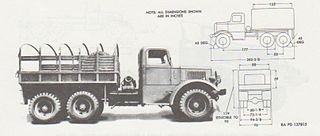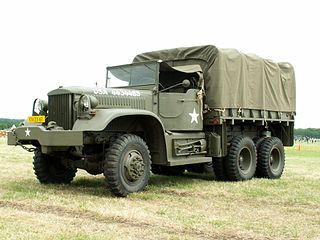
The SCR-270 was one of the first operational early-warning radars. It was the U.S. Army's primary long-distance radar throughout World War II and was deployed around the world. It is also known as the Pearl Harbor Radar, since it was an SCR-270 set that detected the incoming raid about 45 minutes before the December 7, 1941, attack on Pearl Harbor commenced.

The Studebaker US6 (G630) was a series of 2+1⁄2-ton 6×6 and 5-ton 6×4 trucks manufactured by the Studebaker Corporation and REO Motor Car Company during World War II. The basic cargo version was designed to transport a 2+1⁄2-short-ton cargo load over any type of terrain in any weather. Most of these were exported to the Soviet Union under Lend-Lease by the USA during World War II, since the competing GMC 6×6 CCKW design proved to be more suitable for Western Front conditions.

The M39 series 5-ton 6×6 truck (G744) was a family of heavy tactical trucks built for the United States Armed Forces. The basic cargo version was designed to transport a 5-ton (4,500 kg), 14 ft (4.3 m) long load over all terrain in all weather. In on-road service the load weight was doubled.

The SCR-784 was a radar set used by the U.S. Army designed to be an amphibious version of the SCR-584, to control the fire of anti-aircraft batteries, and mounted on a searchlight trailer called a K-84. The set was used to guide the flare plane over the target.

The GMC CCKW, also known as "Jimmy", or the G-508 by its Ordnance Supply Catalog nr, was a highly successful series of off-road capable, 21⁄2-ton, 6×6 trucks, built in large numbers to a standardized design for the U.S. Army, that saw heavy service, predominantly as cargo trucks, in both World War II and the Korean War. The original "Deuce and a Half", it formed the backbone of the famed Red Ball Express that kept Allied armies supplied as they pushed eastward after the Normandy invasion.

The M25 Tank Transporter (G160) was a combination 6x6 M26 armored heavy tank transporter/tank recovery tractor and companion 40-ton M15 trailer introduced into US Army service in Europe in 1944–45. Manufactured by Pacific Car & Foundry Co., it was a substantial upgrade over the Diamond T M19 transporter/trailer duo introduced in 1940.

The Dodge WC-54, Ambulance, 3⁄4-ton, 4 x 4,, was the main military ambulance variant of the prolific Dodge WC series of light 4×4 trucks, developed during World War II. Built from 1942 until 1945, they served as the U.S. Army's main dedicated ambulance, with many also serving in the Korean War, in the U.S. Army Medical Corps, some used as late as 1953; and others serving as late as the 1960s in the armies of some European countries.

The Dodge WC series is a range of light 4WD and medium 6WD military utility trucks, produced by Chrysler under the Dodge and Fargo marques during World War II. Together with the 1⁄4-ton jeeps produced by Willys and Ford, the Dodge 1⁄2‑tons and 3⁄4‑tons made up nearly all of the light 4WD trucks supplied to the U.S. military in WWII – with Dodge contributing some 337,500 4WD units.

The K-50 telephone repair trucks were used by the U.S. Army Signal Corps, during and after World War II, for the installation and repair of hard telephone lines, primarily in territories liberated from Nazi Germany by the Allied forces.

The M425 and M426 Tractor trucks (G671) were 5 ton (4,536kg) load rated 4x2 semi-tractors that were used from 1944 on by the US Army. They are famous for the use on the Red Ball Express from Normandy to the front, but were also used in the China Burma India Theater. After the war they were used in Europe, including during the Berlin Crisis, and in the Korean War.

The Mack M123 (G792) was a 10-ton 6x6 semi-tractor introduced in 1955; the Mack M125 was a heavy cargo truck version of the M123. The M123 was used to tow tank transporter trailers while the M125 towed field artillery pieces.

The Mack NM 6-ton 6x6 truck, officially "Prime Mover Cargo truck (G-535)", was Mack's first military 6x6. It debuted as a prime mover in 1940, and was used for towing AA guns, and ammunition. Gun crews rode in its canvas covered bed. The NM's enclosed cab came from the commercial L-model. Many NM's were used by the British as recovery vehicles.

The Autocar Model U8144T, officially "5- to 6-Ton, 4×4, Ponton Tractor Truck", was the largest, and most heavy-duty, of a family of heavy four-wheel drive trucks developed for, and deployed primarily with, the United States Army in World War II. They were of a "cab over engine" design, and produced by the Autocar Company from 1941 to 1945 with 2,711 being built.

The K-30 truck, a US Signal Corps designation for an Autocar U8144 truck with York-Hoover van body, was used as the Operating Truck for the SCR-270, an early-warning radar of World War II. 2) 3) 4) Similar vehicles were the K-31 power truck for the SCR-270 early warning radar and K-62 or K-62-A, both operating trucks also for the SCR-270. K-30 and the similar K-62(-A) differed in cubic feet and overall height from the K-31. On the accompanying image in the infobox can be seen, that the K-30 beside in cubic feet and overall height differed from the K-31 in having a window on the right side of the van body. The panels at the back and at both sides were formed by two halves, that were folded up and down respectively. This truck contains a high-power radio transmitter, a cooling system for the transmitter tubes, two cathode-ray oscilloscopes, two superheterodyne receivers, a vacuum-tube keyer, a plotting table, and containers for spare parts and tubes.

The 6-ton 6×6 truck was a family of heavy tactical trucks built for the United States Army during World War II. The basic cargo version was designed to transport a 6- short ton (5,400 kg) cargo load over all terrain in all weather. The chassis were built by Brockway Motor Company, The Corbitt Company, The Four Wheel Drive Auto Company (FWD), Ward LaFrance Truck Corporation, and White Motor Company. They were replaced by the M54 5-ton 6x6 trucks in the 1950s.

The Kenworth 10-ton 6x6 heavy wrecking truck (G116) was the standard heavy wrecker of the US Army during World War II. It was replaced in the 1950s by 5-ton wreckers.

The Diamond T 4-ton 6×6 truck was a heavy tactical truck built for the United States Army during World War II. Its G-number was G-509. Cargo models were designed to transport a 4-ton (3,600 kg) load over all terrain in all weather. There were also wrecker, dump, and other models. They were replaced by the M39 series 5-ton 6×6 trucks in the 1950s.




















